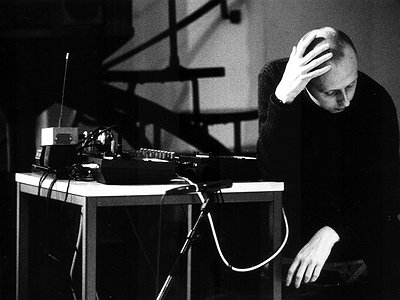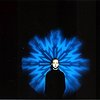Part 1
Name: Robin Rimbaud
Nationality: British
Occupation: Composer, Sound Artist
Current Release: Mass Observation (Expanded) on Room40
Recommendations: Works that currently inspire me:
MUSIC
Carl Stone: Electronic Music from the Eighties and Nineties (Unseen Worlds)
Stephan Mathieu: Radiance (Schwebung)
BOOKS
Alvin Lucier: Eight Lectures (Wesleyan)
Anthony Burgess: The Ink Trade (Carcanet)
Website / Contact: If you enjoyed this interview with Robin Rimbaud aka Scanner, visit his website and soundcloud page for insights, information and music.
When did you start writing/producing music - and what or who were your early passions and influences? What what is about music and/or sound that drew you to it?
I was born in the 1960s and so growing up in the 1970s offered a very different approach to life than it does today. Technology was not as abundant then as it is today, and the very idea of being able to maintain a relationship with the world further than your close friends and family was an impossible fantasy, and could only be achieved by finding a pen-pal on the other side of the globe to communicate with. Today at the swish of a thumb we can meet people, make sounds, discover new worlds.
Thankfully my family had an interest in acquiring the latest gadgets. Though reasonably poor, with much of our belongings, the TV, the video recorder, being only rented from a local company, I was fortunate to be able to play with these tools. One of these was a tape recorder. Nothing fancy, just an ordinary cassette recorder about the size of a large hardback cookery book, running on batteries. My brother and I would spend hours recording around the house, in the garden, in the street. It wasn’t with any intention or understanding of music or sound but because it was simply possible. There was a joy in capturing the world around us, much the same I suppose as people with their mobile phones do today.
I was also fortunate to have a very encouraging music teacher at school who played us, amongst many other things, John Cage’s Prepared Piano works when I was just 11 years old and that utterly blew my innocent little mind! I became truly obsessed with sound and music from that age. Please see the attached photograph I found from an early school book of the some of the (poorly spelt) music I was listening to then :-D
Music was then and continues to be my true love. It was about possibilities and to this day my work and explorations with technology follow a similar enthusiastic route. In many ways, it’s rather like the camera in a mobile phone. I doubt very much whether many of the people documenting every droll moment of their lives would necessarily photograph it were it not for the fact that it’s simply accessible and possible. Technology has enabled me to revel in sonic possibilities.
For most artists, originality is first preceded by a phase of learning and, often, emulating others. What was this like for you? How would you describe your own development as an artist and the transition towards your own voice? What is the the relationship between copying, learning and your own creativity?
Before anyone can begin to find their voice it’s quite natural to be inspired and influenced by others. Interestingly I still have all those cassette tapes I recorded since I began, aged around 10 or 11 years old, so I can listen back to what kind of music I was producing then. It’s curious to recognise how many of them use collage, the pausing of a cassette tape, to connect two sounds or places together. You hear the school bus, my family talking, a distorted guitar pattern, the sound of our family fridge, in fact the sonic picture of my day. So, in some ways, my voice was already there from very early on, drawing on the world around me to produce these pieces. I never considered these tape recordings as anything more than simply recollections, a way to map out and remember a day. Today we might listen back to them in a very different way though.
What were your main compositional- and production-challenges in the beginning and how have they changed over time?
Budget clearly plays an invaluable part on any work beyond simply playing a guitar or piano. When I turned 16 I continued on at school for my A-Levels and my English Literature teacher generously gave me his TEAC reel-to-reel recorder. Now suddenly my sound world was made up of layers of sound. Instead of recording one sound after another onto a cassette, I could travel forward and backwards in time, and combine sounds. Rather amusingly the tape recorder heads were somehow out of alignment so I could never actually keep sounds in sync, so rhythm and melody could not play out their traditional roles.
So, in some ways the failure of technology also played a key role in my creative make up! After university, I saved up money from my job to be able to buy a Fostex four-track tape recorder so I could expand my palette and have the ability to record. In fact, the very first Scanner album in 1992 was recorded live direct to cassette tape on this very machine. Over time the technology became more digital, moving to an Atari ST computer, then an Apple Macintosh computer, whilst still maintaining a foot in the analogue world using tape, microphones and whatever else I could borrow for work. Today my studio focuses more on analogue gear. Real machines I can manipulate by touch, rather than moving a cursor around the screen!
What was your first studio like? How and for what reasons has your set-up evolved over the years and what are currently some of the most important pieces of gear for you?
I think studio is too grand a word for a Fostex 280 tape machine sitting on the kitchen table and a couple of effects – the Digitech Time Machine which allowed me to loop sounds, and the Boss SE70 multi-effects machine. I had to clear these away in time for dinner as there wasn’t enough space in my modest little flat at the time but it worked for me at that point. In time, I moved to another place and dedicated one room to recording so it became a kind of studio in a sense. Buying an Akai S1000 sampler changed my life, despite the fact that it cost me two months wages to actually purchase! I adopted using music software very early on, moving from Notator Logic to Logic Express to Logic Pro, then working with Ableton Live from around 2002, as well as Native Instruments Reaktor software and so on. Today the equipment that truly inspires me is the modular synth environment, offering up so many chance possibilities, and truly gives me joy to play with. The unexpected is always rearing its beautiful head!
How do you make use of technology? In terms of the feedback mechanism between technology and creativity, what do humans excel at, what do machines excel at?
Humans excel at making mistakes, that’s something quite beautiful. We are imperfect beasts, and even though we programme and develop these extraordinary technological systems they are also prone to mistakes or glitches. I’m drawn to moments like this, when the technology fails or operates in a way that was completely unanticipated.
Machines are great at storage and remembering so the perfect tools to recall and rework. However, I’m less interested in the idea of permanence and more in surprises. The older I get the less I want to fall into patterns or repetitive ways of working.
Production tools, from instruments to complex software environments, contribute to the compositional process. How does this manifest itself in your work? Can you describe the co-authorship between yourself and your tools?
The technology itself shapes my work in many ways but often no more so than making it a more fluid process than using a tape and scissors, as I would frequently do in the past with my ancient TEAC reel-to-reel recorder. I embrace possibilities and it’s this aspect and openness to opportunities that has continued to lay the ground for my own productions. Having said that recent advances in technologies where you can literally paint with sound using tools that unravel the magic of spectral filtering with the strengths of a sampler have been a revelation. The sheer flexibility of sound becoming matter and grains that you can shake up into all kinds of previously unimaginable shapes has offered completely new ways of thinking and developing works.
More unusually I’m interested in creating work that bridges a world of abstraction with more traditional note driven composition. I find that my approach and methodologies remain consistent whether I’m working on composing music for a film, or designing soundscapes for an installation. I’m interested in the overall sonic picture and use whatever tools and techniques that I feel would work most successfully. It’s similar regarding equipment – whether I work entirely ‘in the box’ using the computer only, or focus on exclusively using analogue gear simply varies on the task at hand. All of these are tools and techniques that I’ve learnt to apply intuitively dependent on the situation.






